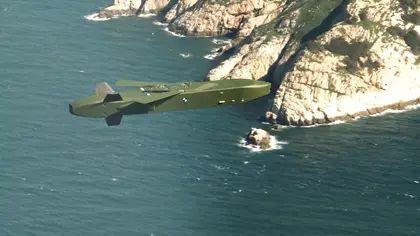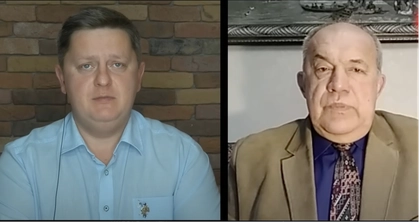Transcripts of a once-confidential audio record of a conversation between four senior German Air Force staff about giving high-tech Taurus missiles to Kyiv showed Luftwaffe top brass is worried the weapon isn’t the right one for the job, and is very disinclined to get involved in Russia’s invasion of Ukraine.
- The basic facts
The planning talk focused on the mechanics of putting Germany’s most effective long-range weapons system into effective use by the Ukrainian military, and possible time intervals between the moment Berlin would make the political decision to hand over Taurus missiles to Ukraine and the time the Ukrainian Air Force could deploy the weapons in battle.
JOIN US ON TELEGRAM
Follow our coverage of the war on the @Kyivpost_official.
The discussion took place in February and was led by Luftwaffe commander Ingo Gerhartz. Also participating was the German Air Force Head of the Operations and Training Section Frank Grefe, a staffer from the Luftwaffe Space Command Air Operations Center Stefan Fenske, and another staff from the center identified only by the surname Frostedte. At least one of the participants used the commercial web conversation app Webex, possibly NNN, who is described as participating in the discussion remotely from Singapore.
Gerhartz said the reason he had called the meeting was so that the four could touch bases on how and what to brief German Defense Minister Boris Pistorius on Feb. 19 about the Luftwaffe’s view of transferring Taurus missiles to Ukraine. Pistorius announced Germany would not make the transfer on Feb. 22.

Holiday Spirit Thrives Among Ukrainians Despite War, Study Finds
Kremlin-controlled media published audio and text versions of the transcript on March 1. A full English-language transcript of the conversation was published by the Moscow-controlled Sputnik news agency here.
The German Luftwaffe Officers Carefully Don’t Mention the War
- The Luftwaffe will follow orders and isn’t interested in politics. German soldiers in Ukraine or actually opposing Russia – even less.
All participants in the conversation focused on the technical details of what the German Air Force would have to do so that if Berlin made the political decision to transfer Taurus missiles to Ukraine, the missiles would be effective. No one expresses an opinion about whether it would be a good idea.
Lt. Gen. Gerhartz in particular is sensitive to the problem of figuring out how to hand over the weapons to Ukraine without the presence of German service personnel in Ukraine, even secretly.
He makes clear that for the Taurus missile’s targeting system to function properly, an operator must load – usually with a “black-box” plug-in containing the latest data on terrain, target profile, and point-by-point flight routing – physically into the weapon before it is placed on the airplane.
For the Taurus to be used by the Ukrainian Air Force as designed, Gerhartz notes, either German Air Force technicians would have to travel to Ukraine to upload the data, or Ukrainian technicians would have to be trained to do it themselves.
The first option is politically impossible, and the Luftwaffe would not agree to it, joint planning with Ukraine would be a “red line” the German military will not cross, Gerhartz says. Training of Ukrainian technicians would require months, Fenske says.
Grefe says: “We have to make sure that from the very beginning, there is no language that makes us a party to the conflict. I’m exaggerating a bit, of course, but if we tell the minister now that we are going to plan meetings and travel by car from Poland so that no one notices, that’s already participation, and we won’t do that.”
- French and British Air Force technicians are in Ukraine, right now, and they are participating directly in the planning and execution of missile strikes on Russian targets.
Gerhartz says the Taurus cruise missile is closely comparable, but not identical, to the French SCALP cruise missile and the British Storm Shadow missile, and that processes developed by the French and British armies to support those weapons’ use by the Ukrainian military are mostly similar to what would be required for deployment of Taurus.
A key piece of that Franco-British support, he said, is the preparation of targeting data to include final target selection by French or British technicians, the conversion of that data to a form suitable for transfer to the missile, and uploading the data into the missile.
The preparation of the data takes place outside Ukraine and the aircraft-ready data is delivered to Poland, after which a British or French courier team, as needed, uses a vehicle to drive from Poland to Ukraine so that the data can be placed onto the missile.
All conversation participants describe the process as ongoing and seem very familiar with it. There is no question as to whether it is taking place. The clandestine presence of French and British technicians preparing cruise missiles to be delivered by Ukrainian bombers against Russian targets and have done so in past Ukrainian strikes against Russian targets, is treated by the Luftwaffe officers as a basic fact.
Based on the conversation, the most likely means by which Germany would accomplish the same thing would be by turning over missiles to the manufacturer MBDA, whose technicians would program the weapons and organize their turnover to Kyiv, giving Berlin total insulation from the risk of German service personnel on Ukrainian territory, Gertz said.
- Unlike the Ukrainians, the Luftwaffe thinks the Kerch bridge is a pretty poor target.
Discussion led by Frohstedte names the Kerch Bridge and ammunition depots in Crimea as probably the best targets for German Taurus missiles, and of the two ammunition depots according to him much easier. Fenske suggests that 10 or even 20 missiles would be needed to knock down the Kerch Bridge which, he says, is effectively the same type of target as a military runway.
Fenske says ammunition depots in the vicinity would be more profitable targets and easier to plan strikes for because the pre-programming would be less detailed. Training the Ukrainians to do it would take weeks and perhaps months, he says.
Ukrainian special operators on Oct. 8 used a semi-truck loaded with explosives to knock down two road spans of the Kerch Bridge and damage an adjacent rail bridge. The attack put the bridge out of action for three months.
According to Ukrainian special operations spokespersons, although Russia has repaired both the roads and the rail line carrying capacity is compromised and neither artery is now able to carry its design weight.
- The German military officers show the attitude that assisting Ukraine is a distraction. They don’t mention the war.
Throughout the discussion, the Luftwaffe staffers refer to the possible transfer of Taurus missiles to Ukraine in a clinical manner and refer to Ukraine being in a war only elliptically.
The actual word “war” is used only once, by Gerhartz, in a comment pointing out that military technology is changing, and the Luftwaffe must change with it.
The only military target mentioned by the Luftwaffe officers is “military depots.”
The word “Russia” is not mentioned once, by any participant.
At the end of the conversation Gerhartz notes he sees no need for his presence at the briefing to Pistorius, and observes that if the Taurus deal goes through, it will be up to Ukraine, not the Luftwaffe, to figure out how to hang the German missiles on the Ukrainian bombers.
Gerhartz says his main priority is maintaining funding to the Luftwaffe to build a big new airbase for a wing of F-35 fighters soon to be delivered by the US.
“Right now, we wouldn’t want to encounter problems with the budget committee. It could make it impossible to start construction work at the airbase in Büchel in 2024. Right now, every day counts when it comes to the program,” Gerhartz says.
You can also highlight the text and press Ctrl + Enter






